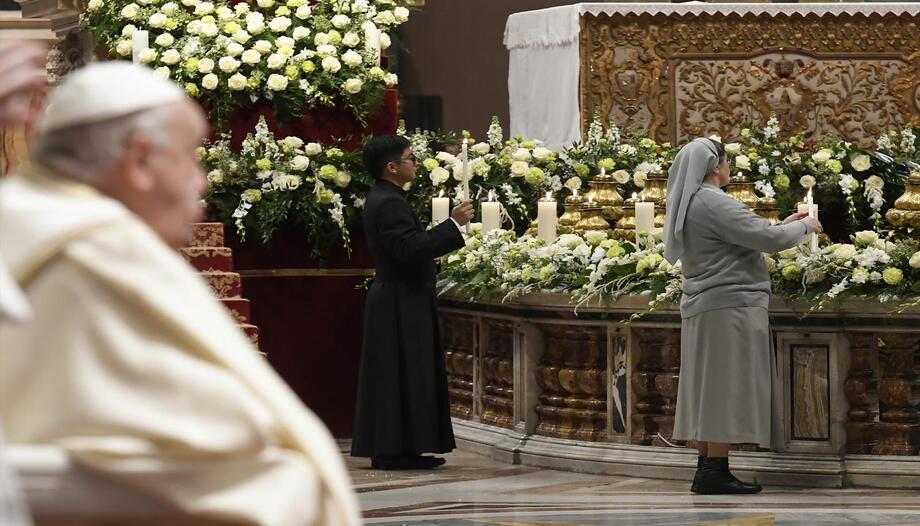The way consecrated women and men live their vows of poverty, chastity and obedience can offer light and hope to a world searching for authentic relationships marked by love and self-giving, Pope Francis said in the eves of the Feast of the Presentation of the Lord.
Looking ahead to the Catholic Church's celebration of the World Day of Prayer for the Consecrated LifeThe Pope thanked the members of religious congregations for their witness, noting that it is "leaven for the Church".
Pope Francis was accompanied by hundreds of sisters, brothers, consecrated virgins and priests of religious orders, including the new leadership of the Dicastery for Institutes of Consecrated Life and Societies of Apostolic Life, Consolata Missionary Simona Brambilla, prefect; and Cardinal Angel Fernandez Artime, Salesian, pro-prefect.
Bearers of light and peace
On the eve, the Pontiff invited consecrated men and women to be light bearers and peace through the vows of poverty, chastity and obedience. And he recalled that the most important "return to the origins" "is the return to Christ and his 'yes' to the Father," Vatican News reported.
Poverty "is rooted in the very life of God, the eternal and total reciprocal gift of the Father, the Son and the Holy Spirit. In the exercise of poverty, the consecrated person, with a free and generous use of all things, becomes for them, bearer of blessing".
Chastity has its "origin in the Trinity and manifests a reflection of the infinite love that unites the three divine Persons". Its profession, in the renunciation of conjugal love and in the path of continence, reaffirms the absolute primacy, for the human being, of the love of God, accepted with an undivided and nuptial heart (cf. 1 Cor 7:32-36), and indicates it as the source and model of every other love".
Obedience versus individualism
Regarding the vow of obedience, the Pontiff indicated that "it is an antidote to such solitary individualism, promoting instead a model of relationship based on effective listening, in which 'saying' and 'hearing' are followed by the concretization of 'acting,' even at the cost of renouncing one's own tastes, programs and preferences. In fact, only in this way can the person experience to the full the joy of the gift, defeating loneliness and discovering the meaning of one's existence in God's great plan.
Sister Simona Brambilla: "moving from the I to the we".
In a reflection on the World Day published in L'Osservatore Romano, the prefect of the Dicastery for Institutes of Consecrated Life and Societies of Apostolic Life, Sister Simona Brambilla referred to the fact that "the Final Document of the Synod on Synodality affirms that 'consecrated life is called to challenge the Church and society with its prophetic voice'.
And he noted "Pope Francis has repeatedly spoken of the call to move from the I to the we, of the need to 'meet in a we that is stronger than the sum of small individualities' (Fratelli tutti, 78), of the 'challenge to discover and transmit the mystique of living together' (Evangelii gaudium, 87), of the 'liberating and responsible experience of living as Church the mystique of the we' (Veritatis gaudium on universities and ecclesiastical faculties, 4)."
"One body, People of God".
"The synodal process has taken up, among other things, the Pauline image of the one body, and has made us experience the 'spiritual flavor' of being the People of God, gathered from all tribes, languages, peoples and nations, living in different contexts and cultures. It is never the mere sum of the baptized, but the communitarian and historical subject of synodality and mission," wrote the Prefect.
"This is the refrain that runs through the 'Laudato si' of Pope Francis. The image of the body expresses in a plastic and clear way the connection that exists between us: we creatures, we humans, we Christians, we members of the Body of Christ which is the Church, we belonging to an Institute of Consecrated Life, to a Society of Apostolic Life, to a spiritual Family animated by a unique and original charism. As in a physical body, each part, each organ, each cell of a "charismatic body" influences the rest (...).
Charisma is "Spirit is Life".
Simona Brambilla then adds: "The Charism is not the property of an Institute, of a Society, of a Charismatic Family. It is a gift of God to the world, it is Spirit, it is Life. The Institute (or Society, or Family) and each sister and brother who is a member of it, receives it as a free gift, a vital force to be allowed to flow creatively, freely, not to be 'mummified' or embalmed like a museum piece".
"In the words of Pope Francis: 'Every charism is creative, it is not a museum statue, no, it is creative. It is about remaining faithful to the original source by striving to rethink it and express it in dialogue with new social and cultural situations. It has firm roots, but the tree grows in dialogue with reality. This work of updating is all the more fruitful when it is carried out in harmony with creativity, wisdom, sensitivity to all and fidelity to the Church' (To the Focolare Movement, February 6, 2021)".







